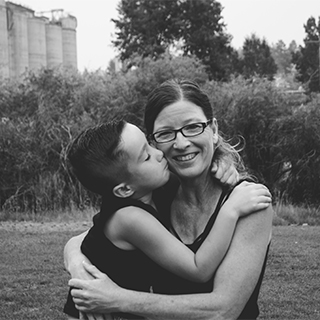A Parent’s Perspective: plexiglass Butterflies - Lessons Learned at the Children’s Hospital

By Elizabeth Hill:
Elizabeth Hill is a freelance writer, encourager, and humorist who resides with her husband and four children in central Montana. You can read more of her musings, eureka moments, and the hilarious events that mark her days with joy at elizabeth-hill.medium.com or find The Part I Love on Facebook.
The aesthetic of a children’s hospital is designed to help you forget that you are in a building you never wanted to be in in the first place. It is cheery with a capital C. The employees are happy and competent. There is free valet parking, as if accessible parking isn’t good enough.
Recently, we had an appointment in one of these centers. I waited for my daughter to return from her procedure in a room divided into sections by plexiglass screens colored boldly with sunshine, grass and butterflies – all serving as a distraction from the fact that I’d rather be in a real park with actual grass watching my child chase legitimate butterflies instead of being sedated, wired, poked and stitched up.
While seated there eating my complimentary granola bar (because, children’s hospital) and watching people come and go, I noticed a couple directly in front of me.
I tried not to be a total creeper, watching them a mere three feet away as they waited to hear how their daughter’s surgery was progressing. They were both on phones, updating family, trying not to cry.
As I watched over the top of my now-forgotten book, the calls and conversations revealed that their six-week-old baby had a heart malformation and the medical team was trying to implant a device with little success. The phone rang with an update from the operating room and as the dad walked toward the phone, I swear the world stopped turning.
I watched the fear and terror fade from his face as he and his wife embraced, crying tears of relief. The implanted device, at first too large for her tiny heart, now miraculously fit. They hugged, sobbed, and laughed through tears while I wiped them from my own cheeks. I sent up a prayer of gratitude for their sweet little baby whose name means “miracle”.
I used to be offended when someone would comment innocently, “I don’t know how you do it.” “It” being raising a child with special needs.
Now, with a few more years of wisdom and empathy under my belt, I recognize the meaning and message behind their words:
“I just don’t know what that feels or looks like.”
“I wouldn’t know where the accessible parking is or which neighborhoods have wheelchair accessible sidewalks.”
“I wouldn’t know how to answer children’s questions when they ask why she slobbers or has a wheelchair.”
“I don’t know how you manage paperwork, doctor visits, and insurance.”
“It all looks foreign because your reality is not my reality.”
Frankly, sixteen years ago I didn’t know the answers to any of those questions either. Hard things are challenging mostly because they represent the unknown: unemployment, cancer, accidents, single parenting, and yes, raising typical and special needs children—all unexpected new territory.
With your own flavors of hard things in your life, I can’t promise you relief and answers lie just around the corner; sometimes there is no corner and the road is straight and unyielding. But I do know that we are never truly alone if we allow others and God in. If you open the door—even just a crack—hope, love and peace come in.
Whatever your belief system, I hope you can find strength in the sorrow, clarity in the confusion, and peace in the percussive pounding of life’s hard things and discover that hard times can indeed be holy times.
A little girl was given a name that means miracle. Her name doesn’t guarantee a challenge-free life, but I believe her parents know that joy and sorrow are besties and you cannot have one without the other.
I have learned intimately that miracles are a natural companion to hard things. The choice we have: do we continuously look backward wishing for the old normal, or do we resolve that this waiting room, this apartment, this marriage, this whatever-it-is-that-we-didn’t-plan-for-or-want-or-think-we-deserved — this life can be happy too? Can we find joy in this new normal?
Can plexiglass butterflies still be beautiful?
Yes.
Yes, they can.
Disclaimer:
The views and opinions expressed in this article are the author’s and do not necessarily reflect the official policy or position of the Montana Family to Family Health Information Center, the Rural Institute for Inclusive Communities, or the University of Montana.

